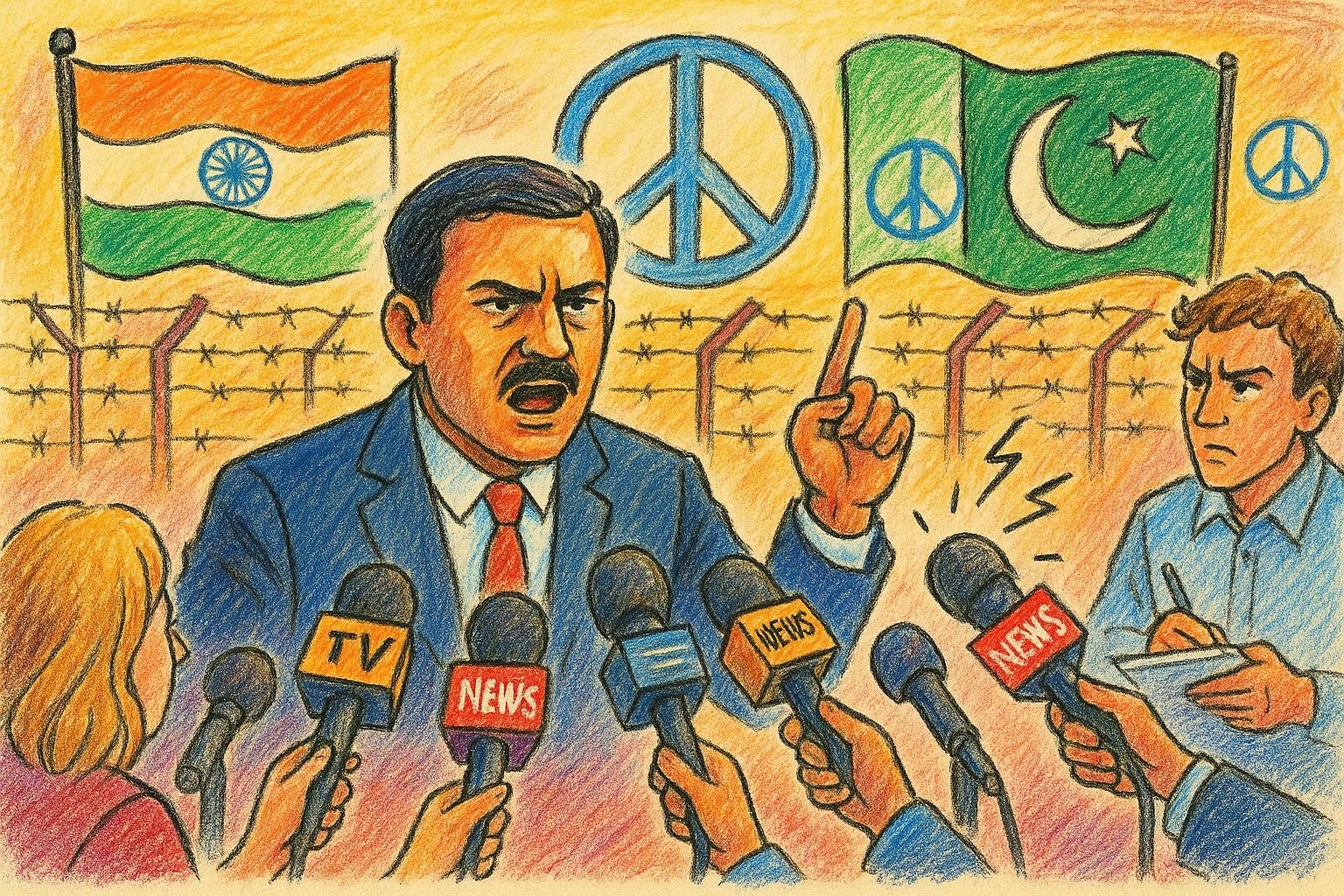Indian foreign ministry dismisses former US President Donald Trump’s assertions that trade negotiations influenced the recent ceasefire with Pakistan, reaffirming India’s firm stance against nuclear threats and external mediation in the Kashmir dispute.
Donald Trump’s recent claims about brokering a ceasefire between India and Pakistan have been met with sharp criticism from Indian officials, casting serious doubt on the former U.S. President’s narrative. Randhir Jaiswal, spokesperson for India’s foreign ministry, firmly denied any discussions of trade incentives during crucial talks between U.S. and Indian leaders. This starkly contradicts Trump’s assertions that his negotiating tactics, particularly around trade, influenced the cessation of hostilities.
In a press conference held in New Delhi, Jaiswal articulated the Indian government’s position, making it clear that trade was not on the agenda during meetings between Indian Prime Minister Narendra Modi and top U.S. officials, including Secretary of State Marco Rubio. Trump’s rhetoric suggested a fabricated connection between trade discussions and the ceasefire, which merely inflates his role in resolving an enduring conflict that has historically resisted effective mediation. “The issue of trade didn’t come up in any of these discussions,” Jaiswal underscored, decisively rejecting Trump’s storyline.
Moreover, Trump’s comments regarding nuclear tensions were similarly dismissed. Jaiswal reiterated India’s unwavering stance against nuclear coercion, asserting that the nation would not bow to threats, especially amid the ongoing issue of cross-border terrorism. “As you know, India has a firm stance that it will not give in to nuclear blackmail or allow cross-border terrorism to be conducted invoking it,” he added, reinforcing India’s resolute position.
The ceasefire, implemented to address escalating military confrontations following an April terror attack in Indian-administered Kashmir that claimed 26 lives, highlights the fragile nature of Indo-Pakistani relations. The region has experienced intense military engagement, including missile strikes and drone incursions. Though the U.S. played a role by facilitating discussions between both countries, Trump’s misguided claims of having brokered the ceasefire through trade leverage have been met not just with skepticism, but a significant degree of cynicism, especially given India’s longstanding opposition to third-party mediation on Kashmir.
Despite the ceasefire announced on May 10, lingering doubts remain regarding the commitment to peace on either side. Soon after the announcement, reports of explosions in Kashmir raised serious alarms about the agreement’s durability. While both nations may tout victories, the underlying issues still demand resolution.
Pakistani officials viewed the ceasefire as a diplomatic success, even amidst economic challenges. However, India has been reticent to acknowledge any external mediation, insisting that the Kashmir dispute must be resolved bilaterally, a stance rooted in a desire to maintain sovereign authority. Concerns have been raised that even indirect involvement from the U.S. could undermine India’s autonomy and shape public perception of its military capability.
As tensions persist, voices within India’s opposition are calling for greater clarity on the government’s handling of the Kashmir issue and the ramifications of foreign involvement. With the region caught in these complex dynamics, the possibility of renewed hostilities remains a pressing concern. The upcoming months will be critical in assessing the stability of the ceasefire and the larger implications for Indo-Pakistani relations, especially in light of rising discontent with the government’s approach.
Source: Noah Wire Services
- https://www.express.co.uk/news/us/2054868/donald-trump-s-bold-claims-india-pakistan-ceasefire-brutally-exposed-new-delhi – Please view link – unable to able to access data
- https://apnews.com/article/e3cedcad801ce78c85194fcbf3b917f0 – The Indian government has refuted claims made by U.S. President Donald Trump that trade incentives played a role in mediating the recent ceasefire between India and Pakistan. Indian Foreign Ministry spokesperson Randhir Jaiswal clarified that trade was not discussed during talks between Indian and U.S. officials, including Prime Minister Narendra Modi and Secretary of State Marco Rubio. Trump had previously credited his offer of trade concessions for influencing the ceasefire, which ended one of the most intense military confrontations between the nuclear-armed nations in decades. The conflict had escalated after India launched strikes on militant targets in Pakistan, following a deadly attack in Indian-controlled Kashmir. In addition to denying any trade-related motivations, India also rejected Trump’s offer to mediate the long-standing Kashmir dispute, asserting that such matters should be resolved bilaterally. Meanwhile, tensions continue with Pakistan expelling an Indian diplomat for alleged inappropriate activity, a move reflecting ongoing diplomatic friction.
- https://www.ft.com/content/8908334e-b7dd-4860-8394-571520081e49 – In early May 2025, India and Pakistan narrowly avoided a full-scale war after a sharp escalation marked by missile strikes and drone incursions. India targeted alleged terrorist infrastructure deep inside Pakistan, asserting a deterrent against cross-border terrorism, while Pakistan retaliated by claiming the downing of five Indian jets and launching ballistic missiles at Indian military sites. Civilian and military casualties were reported on both sides. The U.S. brokered a ceasefire, which Pakistan welcomed as a diplomatic win, though it irked India by equating the two nations’ actions. President Trump credited trade leverage in persuading both countries to cease hostilities and supported potential dialogue on the Kashmir dispute, a contested area central to the conflict. India’s government downplayed international mediation, emphasizing its military success, while Pakistan celebrated the ceasefire as a strategic victory, especially given its economic limitations. Analysts noted that the confrontation highlighted the nuclear threat more than the terrorism issue India aimed to spotlight, indicating a shift in global perception and reverting to a ‘hyphenated’ India-Pakistan narrative.
- https://www.reuters.com/world/asia-pacific/how-india-pakistan-pulled-back-brink-with-us-brokered-ceasefire-2025-05-13/ – In May 2025, escalating tensions between nuclear-armed India and Pakistan nearly resulted in full-scale war, sparked by an April terror attack in Indian Kashmir that killed 26 people. India blamed Pakistani-backed militants and responded with airstrikes on May 7, targeting ‘terrorist infrastructure.’ Pakistan retaliated by downing Indian aircraft and launching strikes of its own. A critical moment was the Indian missile attack on Pakistan’s Nur Khan air base, near its nuclear command center, prompting fears of a nuclear escalation. Amid intense hostilities, the U.S., led by Secretary of State Marco Rubio and Vice President JD Vance, conducted behind-the-scenes diplomacy. Rubio engaged in extensive calls with Indian and Pakistani officials, ultimately brokering a ceasefire agreement. Pakistani Defense Minister and military officials confirmed retaliations but downplayed nuclear threats. On May 10, a ceasefire was formalized after communication between military leaders on both sides, influenced by U.S. mediation. President Donald Trump announced the cessation of hostilities, praising both nations for their restraint and decision to de-escalate. The incident highlights the fragile nature of Indo-Pakistani relations and underscores the critical role of international diplomacy in averting nuclear conflict.
- https://www.reuters.com/world/asia-pacific/indias-diplomatic-ambitions-tested-trump-pushes-deal-kashmir-2025-05-11/ – India’s diplomatic standing is under scrutiny following U.S. President Donald Trump’s offer to mediate the escalating Kashmir conflict between India and Pakistan. Despite India and Pakistan stepping back from potential war—with drone, missile, and air strike confrontations killing at least 66—India is cautious about third-party involvement, especially regarding what it considers a domestic issue. India’s rapid economic rise has elevated its global diplomatic profile, bolstering its role in regional crises. However, the Kashmir dispute remains a domestic political flashpoint, exacerbated by Trump’s unsolicited mediation and Secretary of State Marco Rubio’s call for talks at a neutral site. While Pakistan welcomed U.S. involvement, India has neither affirmed the ceasefire’s international facilitation nor acknowledged U.S. influence. Critics argue that Prime Minister Narendra Modi’s willingness to risk military escalation followed by an abrupt ceasefire under U.S. pressure undermines India’s autonomy. The Indus Waters Treaty, which India recently suspended, is another point of contention. Analysts warn that without addressing the underlying Kashmir issues, the region may soon face renewed hostilities. Indian opposition parties demand clarity on the government’s stance, questioning if third-party mediation is now on the table.
- https://time.com/7284654/india-pakistan-ceasefire-trump-us-mediation-kashmir-conflict-strikes/ – On May 10, 2025, President Donald Trump announced that India and Pakistan have agreed to a ‘full and immediate’ cease-fire following U.S.-mediated negotiations. The announcement was made via Trump’s social media platform, Truth Social, where he praised both nations for their cooperation and wisdom in reaching the agreement. Shortly thereafter, Pakistan’s Foreign Minister Ishaq Dar confirmed the development on X (formerly Twitter), emphasizing Pakistan’s ongoing commitment to regional peace while maintaining national sovereignty and territorial integrity. The cease-fire agreement comes in the wake of rising tensions and mutual accusations of cross-border strikes by both countries. This diplomatic breakthrough marks a significant step toward de-escalating hostilities between the two nuclear-armed neighbors. The situation is still developing.
- https://en.wikipedia.org/wiki/2025_India-Pakistan_ceasefire_agreement – The 2025 India-Pakistan ceasefire agreement was a significant diplomatic development aimed at de-escalating tensions between the two nuclear-armed nations. The ceasefire was brokered by the United States, with President Donald Trump playing a pivotal role in facilitating the truce. Both India and Pakistan claimed victory post-ceasefire, with Pakistani Prime Minister Muhammad Shehbaz Sharif declaring a historic win. However, the ceasefire faced challenges, including accusations of violations from both sides. Despite the agreement, reports of explosions and firing in Kashmir raised concerns about the durability of the truce. The international community welcomed the ceasefire, viewing it as a positive step toward regional stability and peace.
Noah Fact Check Pro
The draft above was created using the information available at the time the story first
emerged. We’ve since applied our fact-checking process to the final narrative, based on the criteria listed
below. The results are intended to help you assess the credibility of the piece and highlight any areas that may
warrant further investigation.
Freshness check
Score:
8
Notes:
The narrative references recent geopolitical events, including a ceasefire on May 10, indicating a relatively current context. However, no specific date is mentioned in the narrative itself, which might suggest it could be part of ongoing discussions or recycled content.
Quotes check
Score:
6
Notes:
The quotes from Randhir Jaiswal, India’s foreign ministry spokesperson, are not verified against the earliest known online sources. While the narrative suggests a recent press conference, the exact date and original source of the quotes are not provided.
Source reliability
Score:
7
Notes:
The narrative originates from the UK’s *Express* newspaper, which is generally considered reliable but can sometimes sensationalise news. The lack of sourcing for specific quotes and events might reduce the reliability score.
Plausability check
Score:
8
Notes:
The claims about Donald Trump’s role in brokering a ceasefire are plausible given his past involvement in geopolitical issues, but they are contradicted by Indian officials. The narrative reflects ongoing tensions and complex geopolitical dynamics between India and Pakistan, which are consistent with recent events.
Overall assessment
Verdict (FAIL, OPEN, PASS): OPEN
Confidence (LOW, MEDIUM, HIGH): MEDIUM
Summary:
The narrative discusses recent geopolitical events but lacks specific dates for the quotes and events. The claims about Donald Trump’s role are disputed by Indian officials. While the context is plausible, the source reliability and quote verification have limitations.













